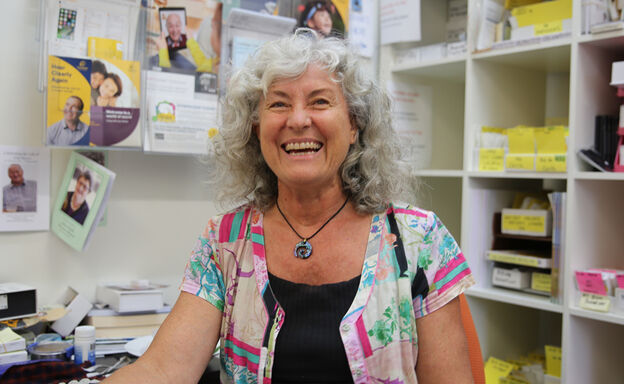- Hearing
It’s been 40 years to the day since NextSense Clinical Support Officer Sue’s first cochlear implant was switched on.
Sue lost her hearing suddenly following a bout of meningococcal disease at age 22. She was the first person to receive an implant in NSW, as part of an experimental program with pioneering surgeon Professor Bill Gibson. In 2005, Sue received her second cochlear implant.
Having cochlear implants has restored sound for Sue and changed her life—and the lives of others—in many ways. We sat down with Sue to find out how.
1. She could hear the sound of birds (and herself) again
Sue’s ability to interpret sound has improved dramatically since her first cochlear implant sound processor was switched on 40 years ago. The ability to process and interpret sound happens a couple of weeks after implantation, when the implant is activated and fine-tuned by an audiologist (known as ‘mapping’).
'At first, when people were speaking it sounded like the characters from the Space Invaders computer game—there were these little beep noises that I couldn’t recognise', she says.
— SueWhen I spoke, I heard this noise, but I didn’t grasp it was mine until I realised the sound was following me like a shadow.
But Sue says that changed dramatically over time and likens the improvement to a fog lifting.
‘Slowly, words started emerging from that fog of sound,’ she says.
Learning to listen required practice, but Sue learned to distinguish between noises in her environment and participate in conversations.
‘My father was a great bird watcher, and he was always pointing out birds to us, so I was always attuned to their sounds. Now when I wake up in the morning and put my sound processors on, I can hear all the birds start up again and it’s really lovely to hear the calls.’
2. She discovered a new career path
Before Sue lost her hearing, she was studying traditional Chinese medicine, working at a pub and attending a lot of gigs with her partner at the time, who was a musician.
When she contracted meningitis, Sue not only became deaf, the disease also impacted her balance, vision and mobility. She was unable to work for several months as she learned how to walk again and adapt to the new challenges she was facing.
She started a science degree at the University of Sydney, later taking up a role at NextSense (then known as the Sydney Cochlear Implant Centre). This year she celebrates 23 years as a Clinical Support Officer with us at our Gladesville centre, where she helps our clients to understand and use their cochlear implants, and participates in research and testing of new devices.
Sue says there is a lot of misinformation and fears around cochlear implant surgery, and it’s important that people get the right support, through auditory training and familiarity with the technology.
During her time at NextSense, she has watched her clients and their families grow and flourish, and says it’s one of the best part of her job. ‘I get to see little kids who I knew from a very young age that are now young adults and they've got a great career, great job—just a life of their own.
— SueI love talking to the mums of little children that have implants. Choosing to go ahead with cochlear implants for their children is a big decision for a lot of parents, so it’s great to be able to chat to them about how they feel about it. It also gives me insight into other ways to help people.
3. She found a community
Since getting her implants, Sue has found a new community—one that she is dedicated to.
‘I've met lots of lovely people through having a cochlear implant. It just opens up your eyes to other people and the issues that they have in their life’, she says.
She is one of the founding members and the President of CICADA, a support group for people with or are considering cochlear implants that she helped establish in 1984. Run by volunteers who have first-hand experience with a cochlear implant, it has groups operating around Australia.
Sue says it’s incredible meeting people of all ages who are benefiting from a cochlear implant.
— SueIt’s just amazing how some people have had an implant at quite an advanced age and are really able to benefit from it. It just goes to show that there's people out there still wanting to live a full life at a very late age.





